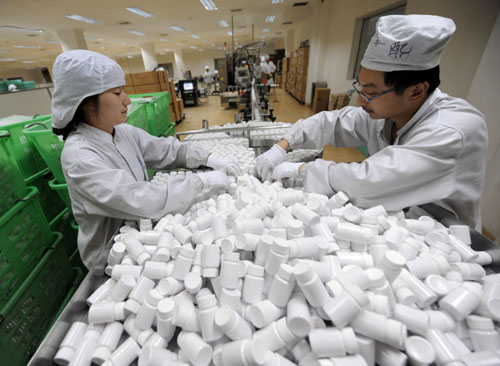TCM exports set to rise at a healthy clip
Updated: 2012-02-10 13:59
By Liu Jie (China Daily)
|
|||||||||||
BEIJING - The value of traditional Chinese medicine exported from China is expected to increase by more than 10 percent a year during the next five to 10 years.
|
 |
|
Workers arranging bottles of traditional Chinese medicine at a pharmaceutical plant in Hangzhou, Zhejiang province.[Photo/China Daily] |
The growth rate for the exports measured by weight is expected to increase from 5 percent to 10 percent annually during the same period, Liu Zhanglin, vice-president of the China Chamber of Commerce for Import & Export of Medicines and Health Products, said.
"The growth in the export value is forecast to be higher than the weight increase because the prices of raw materials used in traditional Chinese medicine are increasing continuously," he said.
He said the demand for the medicine is ever-increasing in the international market and that will help maintain a steady increase in exports of traditional Chinese medicine.
The value of those exports increased from $600 million in 1996 to $1.8 billion in 2010. Traditional Chinese medicines include proprietary Chinese medicines, raw materials and ingredients, as well as herbal extracts.
The value of China's exports of the medicine reached $2.33 billion last year, an increase of 36.2 percent from the year before, according to the chamber. At the same time, the weight of the exports increased by 14 percent and the prices of such products increased 23 percent.
"Given the appreciation rate for the renminbi in 2011 - which was about 7 percent - the value of traditional Chinese medicine exports hit a record last year," Liu said.
To sustain export growth, Chinese companies are working to make prices more stable and modify the composition of the exports.
During the past few years, the proportion of raw materials and ingredients among exports has decreased and that of herbal extracts has risen.
"The herbal extracts are semi-processed products ... so they have more added value," Liu said.
Although the future is promising, Chinese exporters are faced with trade barriers and other obstacles.
In May 2011, the European Union imposed new registration requirements on makers of traditional Chinese medicine, a step that has hindered imports of proprietary Chinese medicines. South Korea, one of the biggest importers of the raw materials used in the medicine, also adopted stricter quality and registration requirements.
In keeping with China's 12th Five-Year Development Plan for the Pharmaceutical Industry (2011-15), the government will improve industrial standards for traditional Chinese medicine, which will help companies in the business deal with technology issues that arise in the international market.
The country, for instance, will carry out scientific research on 300 ingredients used in traditional Chinese med to Chinese exporters who must register their products abroad.
"Our chamber will continue to provide market analysis and training for traditional Chinese medicine companies," Liu said. "And we will also strengthen cooperation with government departments, research institutes and trading agencies to establish industry-supporting policies, such as the establishment of international trade guidance for traditional Chinese medicine."
Related Stories
Flying the TCM flag 2011-08-26 11:52
Scraping your illness away 2011-07-20 16:57
Trying out traditional medicine 2011-07-20 16:57
Intl students learn TCM in China 2011-07-20 11:04
- China's Jan exports drop 0.5%
- Lanxess issues 500m yuan in 'dim sum' bonds
- China's current account surplus narrows in 2011
- LVMH fund buys stake in Chinese fashion brand
- New Year inflation jumps higher than estimated
- Salary hikes to exceed inflation
- TPG raises 4b-yuan fund in Chongqing
- China auto sales fall 26.39% in January








